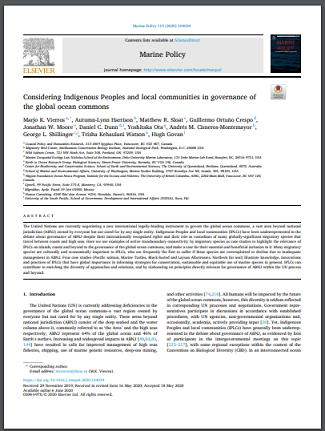
The United Nations are currently negotiating a new international legally-binding instrument to govern the global ocean commons, a vast area beyond national jurisdiction (ABNJ) owned by everyone but not cared for by any single entity. Indigenous Peoples and local communities (IPLCs) have been underrepresented in the debate about governance of ABNJ despite their internationally recognized rights and their role as custodians of many globally-significant migratory species that travel between coasts and high seas. Here we use examples of active transboundary connectivity by migratory species as case studies to highlight the relevance of IPLCs on islands, coasts and beyond to the governance of the global ocean commons, and make a case for their essential and beneficial inclusion in it. Many migratory species are culturally and economically important to IPLCs, who are frequently the first to suffer if these species are overexploited or decline due to inadequate management in ABNJ. Four case studies (Pacific salmon, Marine Turtles, Black-footed and Laysan Albatrosses, Northern fur seal) illustrate knowledge, innovations and practices of IPLCs that have global importance in informing strategies for conservation, sustainable and equitable use of marine species in general. IPLCs can contribute to enriching the diversity of approaches and solutions, and by elaborating on principles directly relevant for governance of ABNJ within the UN process and beyond.












